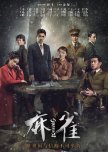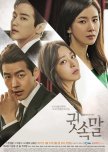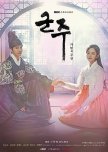
I wouldn't recommend it to people who are only into 1. straightforward romance, 2. lots of physical action. It has regular outbursts of action every few episodes alternated with strategizing and processing. It doesn't have many quests neither, only one overarching search of a McGuffin file. (Boy, was The Emperor and his jar a good preparation for this one.)
Just like Nirvana in Fire, Sparrow throws the viewer headfirst into already ripened events and flows like a chapterless novel. It has arcs when a new character is introduced or a focus shifts, and they have consequences afterwards.
The show belongs to Reveal rather than Develop school of character writing. The characterization is rough around the edges at first (it starts from a bulletpoint list of traits - for example, MC drinks Kvass, can't shoot due to a past trauma and puts an act of the playboy and gambler who'd rather be a barber than an agent), but turns into something alive and humane thanks to giving characters an opportunity to form alliances and bond. You can tag it with 'bromance' etc, but it's far beyond it. MC doesn't monopolize the screentime. There's a love triangle/square/meandering hexagon (with tentacles - you should see my chart) at the core, but it's not used as a plot propeller and a sole source of conflict. Close antagonists are humanized. It's chock-full of layered, multifaceted characters with their own mannerism. A line between faked and real relationship is blurred. I'm afraid to say anything more not to get into spoilers.
The first half (one third perhaps?) is mostly devoted to damage control and it lulls the viewer into thinking danger can always be redirected to scapegoats, and then things get real, breaking that expectation. The plot is stretched between an urge to maintain the status quo and a sense of urgency, making this desire impossible. Having spent so much time with all the characters and seeing their circumstances, it's hard to condemn those who on the scale of greyness fall into lukewarm/opportunistic territory or tilt toward derangment (especially since they're so charming or have grand entrances…). As if they weren't already, things get so tangled and tensed no single solution can fix them satisfyingly. The file is just an excuse to watch it all happening. Save yourself the frustration and don't expect more from it.
The show is beautiful to look at, crafted with an attention to detail and the use of music greatly improves the experience. More than once I was just spacing out looking at the colours changing or rewinding little pieces of fun editing of facial expressions/general movement like a cat pulling out tissues out of the box. It's definitely a rewatch material for me, both for just enjoying it visually and for re-immersing into that world. Highly recommended. Safety first!
Was this review helpful to you?

What to expect: a festival of backstabbing.
Don't watch it if you despise convenient plot points, because almost every single twist and turn here is exactly this.
Imagine a storyboard, an intricate and tensed network of possible outcomes. As the story flows, it forces some lines to close down. Some chess pieces are bound on their positions, limiting the movement of others. Some are taken down (destroying evidence is a recurring theme of the first half or so - which, realistically speaking isn't a wisest move on a characters' part, but it's necessary for the plot to move forward; once a deal is finished, it's impossible to restore the former status (but hey, there's a twist on this too!)).
The first episode is a gateway of sorts, filtering out the viewers who aren't for this kind of story (the controversial part is even in the official trailer). A journalist gets killed, his friend framed for it, and a judge known for his integrity blackmailed to announce him guilty. Framed man's daughter seeks the judge's help, but feels betrayed in the end and sets him up, trying to create a pressure point on him. He ends ups tangled between Taebaek law firm's all-reaching influences and her blackmail, facing an impossible choice. Sprinkle with hints of latest political scandals from real life and you have a Taebaekgate of your own.
WORLDBUILDING
There are no right choices here. It's a bleak and ruthless world in which power overcomes truth and justice can be bought. Everyone important knows each other and sits in Taebaek pocket. The law firm serves as a symbol here: it recruits its employees from the elite lawyers, prosecutors and judges by orchestrating their downfall from behind and generously offering them a place to stay. Then it feeds on their former reputation and abilities.
Many people complained that a hero introducted as just and incorruptible breaks so easily and turns shattered and 'spineless' during first few eps, but that's the point. 'Whisper' suceeds in creating a sense of encirlement, hopelessness and inevitability.
CHESS PIECES
Characters' cunnery manifests in being in right places at right time with right people and smirking knowingly. They're smart enough to forsee one or more moves of the opponent ahead, but it doesn't mean they don't lower their guard from time to time. And yes, deadpan and smirk (and furrowed brows…) are dominant expressions, but first, I don't think it was actors choice, two, there's much more to it (a honourable mention for Hyung Mook, let's hope to see more of him in the dramas).
There's no clear, progressic character development, only people being poked from different angles and reacting accordingly. In a sense, it's not about Dong Joon and Yeong Joo substantially changing at all, because those two (especially she) were badass from the start, only their means were limited. For them, it's about achieving their goals. They come to their original point, only stronger and calmer. What changes the most is everyone around them losing their comfort, realising that the rotten world they know so well affects them too, that they too could also fall prey of a betrayal, not just stage it for others, and that people they trust and love won't always put their good first. All the sense of comradery in crime falls apart.
ROMANCE TAG
There's a love line and it stopped me for some time from even starting this. (Two, actually, but I don't want to completely rob you out of feeling smart and perceptive in a first few eps.) Its existence may or may not feel a little forced. It develops gradually and for the better part of the show consists mainly of male lead spacing out watching female lead being awesome, his gaze tinted with guilt. If you don't feel like watching a drama with a romance tag, you can safely ignore that for the first 12 episodes or so and pretend they're just partners with a hostile start, reaching an adorable intimacy later [here would be a gif of Dong Joon stealing a bite of Yeong Joo's salad from her plate].
However, the important part is: they both have agency during the show, can act separately and aren't overly protective. In the end, them developing feelings for each other serves as just another pressure point.
I could say there's a 'strong female lead' (and it applies to both to various extent), but the thing is, not a single character is gender-limited to begin with. They aren't forced to act or behave like males or females at all.
Also - the poster is right. It's not about main couple and their vengance only, all four characters are equally important. I'd even argue that the other two carry the story once the things between the former are roughly settled.
What it doesn't depicts, are four fathers. There's a rivalry and resentment between Choi Il Hwan and Kang Yoo Taek and it cast a shadow on their children. Lee Dong Joon has family issues too. But all of this is treated as a mean to a purpuse.
17 HOURS OF YOUR LIFE
I tend to avoid crime/law/suspense/mystery/… dramas longer than 10-12 episodes, because stretching it further calls for people running in circles like a headless chickens and creating misunderstandings that could have been easily avoided if they just stopped and used their brains for once. Not a case here. On the contrary, obstacles come from constant betrayals on every front and people trying to protect oneself on other's expense. The pacing is fine. It takes some time to dismantle stalemates within stalemates and get enough power to force the truth. When this drama does prolong some event or a threat, it does it in such a manner to close all exits but one. For example, you can see someone soon-to-be framed for something at the beginning of the episode, but it takes some preparations to make sure that person will have little to no possibility to get out, and if s/he was taken sooner, s/he could save him/herself much easier (enters a fire destoying what little evidence have left). It's logical and kinda mechanical.
Anyway. I didn't skip a scene, which is something to brag for me these days. There was a week-long break forced with the presidental election coverage, but it's not noticeable. Recaps and flashbacks are minimal if any during the better part of the show, but there's more towards the end, because it was originally written as a 16 episode drama.
It's not super realistic in details, but uncanny in essence. The story is cleared out of all the accidental clutter and wholly focuses on the main plot and connected subplots showcasing the main players. Don't expect much of legal cases or police investigation. They do work, but it mostly serves as a setting since they don't meet mundane problems or unrelated cases. If something comes up, it's used as an exposure point, to reveal something from the past or to create a new problem that can be used against someone. Characters have only skeletal backstories - and for me it works. For many it doesn't.
Generally speaking, if you don't feel an urge to cheer for your characters, but rather shake them, throw on an arena and see who'll last, you've found yourself something to watch.
MUSIC
Tolerable and sparsely used for a kdrama standards, mostly instrumentals and background noises (clock ticking etc). Main theme is a latin chorus (with a hint to an early plot point), but it's nowhere near as pretentious as say, K2.
VISUALS
That's the biggest forte for me. First, it's stylish, two, it's fitting. It heavily relies on contrasts. Taebaek resides in a fortress-like building, a huge grey cube with slot-like windows. (Of course it has an open roof for dramatic conversations in the wind, duh.) It's interior is all glass, chromium, highly polished marble and some rough stone on the walls. Tight, dimly lit corridor leading to the owner's office ends with an anti-chamber filled with a terra cotta army and two hostess taking away all electronic devices from the guests. It's an example, but there are many locations and they all match the common theme. Interior decorations items are used within the plot. People mostly wear elegantly matte fabrics and everyone is coordinated for the sake of coherent screencaps. Even PPL doesn't hurt the eyes that much. The lighting is cold, blueish and artificial and it bonds all the scenes for the scale I haven't seen before in a kdrama. It's on par with Cruel City's grittiness and darkness or W clear division between two worlds when it comes to a coherent worldbuilding.
HUMOUR SAMPLE
'My father is not here today, they are having a praying meeting in their community, so the embezzlement of the temple funds won't be found out.'
Pros:
- Highly motivated, flawed, charismatic characters
- Reasonably smart intrigue (forming alliances and shuttering it, finding weak points and exploiting it)
- Good acting
- Even pacing, engaging power struggles, focused storytelling, clear and somewhat elegant structure
- Visually pleasing (and it's an integral part of the worldbuilding)
- Comic relief isn't overused, neither is the story too dry and serious
- not makjang.
Neutrals/cons:
- Convenience everywhere. Some things that never have any business be written take tangible form.
- Music fits the mood and action, although it ranges from forgettable to 'dear lord, not K2 again'
- Romance feels forced an unneeded.
- Not very engaging on an emotional level (there's a lame attempt of holding the viewer hostage with making one character badly sick in the middle, but I still don't really care for anyone or anything). It brings out repulsion, pity maybe, a satisfaction from people meeting their end and justice triumphing, but that's it.
Was this review helpful to you?

It's about dreams, too (another banality on paper). And counterfeiting money. The better part of the plot could belong to an action movie, but the drama approaches it in a casual, slice-of-lifey manner. One arc turns very brothers Coen.
It's fun! In a quirky, gloomy way, with plenty of situational and visual humour stuffed in between tender moments. Beautifully written and directed, playing with conventions, often showing-not-telling and fully using the potential of each episode being a complete entity that can tell a story from a certain point. Highly recommended.
Was this review helpful to you?

This review may contain spoilers
I WATCHED IT SO YOU DON'T HAVE TOIf you have to prioritize, watch the first episode and judge for yourself, because some tricks and stretches are telling for the overall quality and worldbuilding. Are you OK with random commoners using Lee last name (and it somehow being an important factor for maliciously choosing a crown prince's substitute)? How about a poison that has to be re-taken every 15 days otherwise the afflicted person will die? Or a poison that makes the survivor immune to all the other poisons in the world? Do you buy the reasoning for hiding crown prince's face behind a mask? Unless you really can't stand prolonged misunderstandings and great love built on lack of communication (or even shared screentime), you'll be OK with the rest.
(And speaking of the setup, I have no idea what were they thinking using prince Sado's name, since it can't even be considered an alternative, rice box-free version of that story. Maybe the writer had something planned but she forgot about it in a meantime? Or wanted to troll us with a prospect of a tragic ending?)
Despite all the plotting, accumulating power and changing teams going on, there's not enough plot to last for 20 hours (and a 5 years long time skip during which 1st female lead regressed and everything interesting apparently just happened to the other three). Some matters, like finding a poppy field, could have been resolved around 1/3 of the show and don't even start me on that jar that no-one bothered to come and get until the very end. Really. There were two quests in total and they were both lying sidelined waiting for a person in charge to get to his or hers grand moment, because everyone else was too busy creating misunderstandings, being a noble idiot or passively looking from behind. Right, they needed to make an antidote too, but that just happened last minute.
To make matters worse, due to the episode getting split in half it wasn't 20 eps but 40 shorter ones. So double the cliffhanger / wet blanket combo and add general lack of fluidity here and there. With that being said, it's not a show to watch for the plot and the overall pacing fits what little character development we see. Except most of it is thrust upon the second leads.
Storytelling is mediocre at best and very predictable in a short term (still engaging on a longer run). You can have a drinking game for everything that happens on cue and every seam that shows through. Expect lots of convenient timing used for the sake of the dramatic effect and main characters doing nothing and getting away with it, because events resolve themselves without them. I'm not even talking about overused hijinks like the main girl coming back from her task all down and changing her mood midsentence, saying to the crowd's relief she suceeded, or that scene when the crown prince was being mourned only to show above someone's shoulder and ask who's dead. And let's ignore that General who fought Jurchens, because he's such a stock character I physically cringed every time he spoke. His lines were like something a kindergartner with a wooden sword would improvise, that kid that gets some episodic part because someone has to do it, and maybe doubles as a tree. Someone on kissasian commented it's like the writer was using a textbook on how to write a segeuk and I fully agree. It's a second rate fanfic writing in a high budget decorations. Easy on eyes and ears, engaging, but only until you take your eyes of it and start looking at the whole picture. With a different cast and lower production value, it'd be unwatchable.
The romance is bland and angsty. They meet, they instantly fall in love, some misunderstandings happen to them [enters 'came from the dead, pretends to be his own lookalike' trope sprawling over the better part of the middle], they separate, they're back and everything is all dandy. The end. The second leads meddle into it, but they never had a chance and weren't even looking for a different options, so there's no thrill. Fill the empty spaces with speeches on the common people suffering under Evil Corp, the legitimacy of power, qualities of a good leader and apologies towards villain who was clearly forced by a circumstances and badly run country to turn evil, poor thing. The show takes itself very seriously, but comes off silly and pompous despite some original concepts thrown at the beginning. I wish writers had a better idea of showing Ga Eun's independence than making her going blindly her way, without consulting people around her and making informative choices. I'm not saying asking for permission, but communicating with a person she supposedly loves that much. I suspect reasons for that are not exposing her trait as much as having her in one place with the second male lead and under his power, and giving the first male lead an opportunity for a dramatic run through a city stopped on crossed halberds. She could be much more than that -- and she was, but it derailed.
WHAT'S IT WORTH WATCHING FOR:
Hm. Let me think. YSH was born to play royals. He's charismatic, commanding and has them dramatic gazes covered. And not forget his deep voice. But we didn't need a 20 episode drama to confirm that. Both he and KSH are wasted in their roles of a sheltered prince taking a responsibility and a trophy girl. A kind, caring, underinformed trophy girl fighting for a justice. With 15 minutes of a heavily reused footage her character had more impact on the story in Goblin than here. Wait, I meant to stay positive. Both leading actors managed to carry their characters thanks to their charisma and breathed some air into subpar writing. Both second leads showed improvement compared to some of their former works. Second female lead comes quite a way from a creep playing with her knife (or was a needle?) and inflicting on herself a wound to match with the one the crown prince got to an independent, succesful woman standing against her family and making great sacrifices. Second male lead shares 1st lead burden and tries to navigate in an unfamiliar environment until he can't take it anymore and breaks apart. Villain is entertaining to watch and not omnipotent (close, but not), but towards the end he's getting out of character (or was he always delusional?). The other villain has a motivation so murky and changable I won't risk a guess what was she actually plotting, but I doubt it was intentional anyway. At some point it looked like we've got a few more secret organisations to stir things up, but keep your hopes low. As soon as they were introduced, they got tossed away. [Looks like that's as far as my positive attitude can get me.]
Rating it anything below 7 is mean towards production team and actors, but the writing really brings it down. You can safely skip that one, but if you feel like watching something light, why not give it a shot and see for yourself. [But don't even a light show need a more convincing romance, if nothing else?]
Was this review helpful to you?























